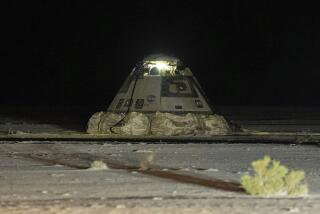Dead Battery Kills Shuttle Experiment
- Share via
KENNEDY SPACE CENTER, Fla. — NASA canceled a major experiment aboard space shuttle Discovery on Saturday--the release of six metal balls--because of a dead battery in the ejection system.
“The best thing to do is to call it quits at this point with that experiment and go ahead and bring it home,” said flight director Milt Heflin.
Space debris researchers wanted to track the orbiting balls with radar and telescopes to fine-tune their instruments and improve their ability to track small objects.
Discovery’s astronauts were about to eject the balls from a can in the cargo bay Friday when they received bad signals through the deploy-mechanism electronics.
Mission Control put off the test and assembled a trouble-shooting team in hopes of salvaging the experiment. But flight directors gave up when the problem was traced to a dead battery.
The battery is located in the can in the open cargo bay and is inaccessible to the five astronauts. Flight directors decided it wasn’t worth the risk to have the crew try sending commands to the equipment, Heflin said.
The astronauts also had to scrap more laser tests Saturday. A New Mexico snowstorm and clouds over Alabama’s Redstone Arsenal prevented researchers from beaming up laser signals to Discovery.
The Army wants to see whether laser signals containing navigational data can be acquired in space.
The five astronauts had better luck with a military camera experiment, although they were going through batteries faster than planned. Again and again, they had to forgo a planned target because of cloudy weather, but managed to snap pictures of clear nearby sites.
Among the few original targets with clear skies were the Somalian coast and Minnesota’s Duluth International Airport.
Officials insisted the photographing of Somalia had nothing to do with the impending deployment of American troops to the East African nation.
More to Read
Sign up for Essential California
The most important California stories and recommendations in your inbox every morning.
You may occasionally receive promotional content from the Los Angeles Times.










